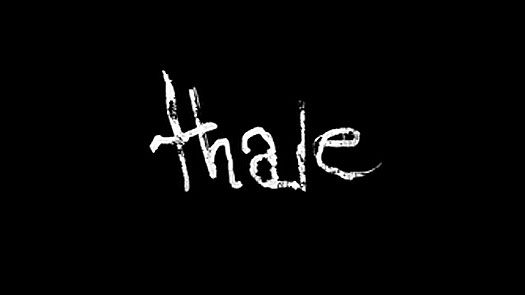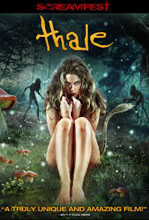
 BUY FROM AMAZON: CLICK HERE!
BUY FROM AMAZON: CLICK HERE!
MSRP $20.99
RATED NR
STUDIO XLRator
RUNNING TIME 77 minutes
SPECIAL FEATURES
• Trailer
The Pitch
You can take the fairy out of the wild, but you can’t take the wild out of the fairy.
The Humans
Silje Reinåmo, Erlend Nervold, Jon Sigve Skard, Aleksander Nordaas
The Nutshell
Elvis and Leo, two crime-scene cleaners, discover a mythical female creature in a concealed cellar. Her name is Thale (pronounced TAH-luh), and she never utters a word, but the pieces of the puzzle soon come together: she’s been held captive for decades for reasons soon to surface…
The Lowdown
I’ve always loved fairy tales. I’m not talkin’ about your cute, pint-sized, winged, Tinkerbell-ass FernGully bullshit. I’m talking about European folklore, which often portrayed fairies as malicious tricksters. These were creatures to be feared and avoided. They operated outside the comprehension of man. To put it simply: You didn’t fuck with fairies.

Asbestos. Asbestos everywhere.
Storytellers like Guillermo del Toro and author Holly Black understand fairy lore well enough to avoid tired tropes. They inject the notion that fairies are ancient, mysterious, and operate with no regard for human well-being. A good fairy story always ends with a sense that we’ll never understand fairy culture, and that meddling in their affairs could get you killed. I’m happy to report that Thale is able to bottle that distinct sense of mystery and menace, much like Holly Black’s Tithe (a not-so-young adult novel) or Pan’s Labyrinth did. They built upon existing mythologies to create their own unique riffs.
In Scandinavian mythology, the Huldra is a creature that inhabits forests. She appears as a beautiful woman with a cow’s tail, seducing and charming naïve young men to their deaths. Thale is about what happens when someone tries to raise a Huldra in his basement.

Surely there’s nothing hiding in the creepy milk bath.
Director/Writer/Cinematographer/Editor Aleksander Nordaas shot the film in his little hometown in the middle of Norway. The lushly decorated basement set in which most of the film takes place is actually his dad’s basement. Despite these potential limitations, Nordaas has made an honest, unpretentious, and polished final product. His efforts have helped this very little film became one of those little films that could, gathering some good word-of-mouth. Last year, it was screened at SXSW, Screamfest, and TIFF.
Similar to Vincenzo Natali’s Splice, Thale briefly flirts with the concept of attraction to a beautiful, humanoid creature, but the sexuality on display is a lot less bizarre and incestuous. Despite the fact that our beautiful Huldra spends most of the film naked, our main characters never treat her as a sexual object. She is for the audience to ogle. Her circumstances are such that she is an obvious victim, but we also understand that while she may look human, she definitely isn’t. The narrative defines her as distinctly inhuman. This raises an interesting question: if this titular creature isn’t human, does that mean she’s another victimized woman in a film designed to titillate a male audience? Is a character a woman even if she only looks like one? For instance, Captain Kirk bedded more than a few alien babes in his career, but those characters were women before they were non-human. I feel that Thale is quite the opposite, since our protagonists don’t overtly sexualize her.

That glistening gas mask look gets me every time.
Another prominent theme in the film is nature versus nurture. Thale was taken from the forest at a young age, and raised by a man. Unlike her kin that were raised in the wild, she retains her mostly human appearance, and is highly intelligent. What becomes apparent is that her “captor” knows quite a bit about her mysterious race, and is able to compare her development to the Huldras that inhabit the nearby woods. Throughout her life, she feels the deep, instinctual pull of the forest, but is still afraid of leaving captivity. We learn about this through the audio diaries of her deceased captor, a narrative device that should feel familiar to anyone who plays video games. It works well, preventing too many flashbacks, allowing us to see how Elvis and Leo react to the often frightening sounds on the cassettes. This places the narrative importance of our characters’ reactions on the same level as their histories. Thale herself is all reaction and facial expression, a result of her inability to speak.
Just because she isn’t human or capable of speech doesn’t mean she’s incapable of complex emotion, though. Silje Reinåmo’s performance is animalistic and sometimes brutal, but elegant. Her facial expressions and body language speak volumes, making up for the fact that she doesn’t utter a single word. The rest of the film’s performers match her energy, and the standout among them is Erlend Nervold, who plays our lead male character, Elvis. He is an impeccable wimp, wide-eyed and gagging at the sight of blood. He’s a great contrast to the cool-headed, iron-stomached Leo.

“Just a pinch o’ this and my fricassee will be PERFECT!”
I don’t have many complaints about Thale, but I do think some viewers could be turned off by how small the film is. I know this is a somewhat dubious criticism, but some could say not much HAPPENS during the film. Even though the film may be only seventy-six minutes long, it’s not a brisk seventy-six minutes. The narrative is stretched a little thin. It does allow some really interesting interactions to take place, and we do get a substantial backstory for Thale herself. At times, a much more complex film feels trapped inside a dingy basement. The film boldy reaches for something grander, which is especially evident in a scene of stylized, speed-ramped action that feels very out of place. The few flashes of CGI in the film aren’t Hollywood quality, but they’re perfectly acceptable for a movie that someone filmed in his Dad’s basement.
What works so well about Thale is that it manages to take something as large as Scandinavian mythology and strip away unnecessary scale and grandiosity, making for an engaging small-scale drama, flecked with bits of horror. It’s beautifully scripted, slickly shot, and well acted. It displays a warm reverence for nasty fairy lore, while still giving us a contemporary chiller that will surely satisfy fans of foreign horror.

Aww, she’s reading her tail a bedtime story.
The Package
For such a low-budget production, the video quality on the disc is surprising. The basement set is drenched in sepia notes, moldy greens and jaundiced yellows, while flashbacks are mostly blue-hued. It’s a palette reminiscent of The Matrix, and the transfer does it justice.
There are two audio tracks on the disc: a 5.1 Norwegian mix and a 2.0 English mix. I only listened to the Norwegian, and I’m happy to report that it’s fairly punchy, with some really nice rear channel work.
Disappointingly, the disc sports a trailer as its only extra. For fans of the film, there is a really great featurette on YouTube put together by director Aleksander Nordaas. His English is impeccable, so it’s a real shame we didn’t get a commentary on the disc. Considering how much I enjoyed Thale, I would’ve loved to hear more from the talented young director.
Rating: 




Out of a Possible 5 Stars